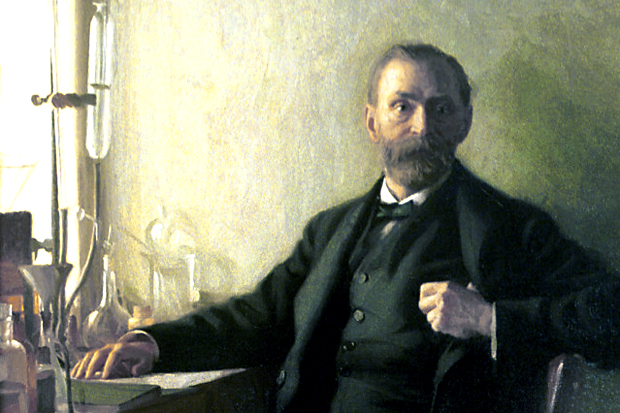10 facts you didn't know about the Nobel Prize
A plethora of Nobel facts for your next game of trivia

The late, great Alfred Nobel
In preparation for the official Nobel Prize ceremony on Sunday, we give you some of the highlights (and lowlights) from the award's 116-year history:
A Blast from the Past
The prizes were created by Alfred Nobel, a Swedish businessman whose contributions to society included inventing dynamite and manufacturing armaments. In 1888, his brother Ludvig died, but a French newspaper mistakenly ran an obit for Alfred titled, "The merchant of death is dead."
Apparently, this caused Alfred to suffer such a crisis of conscience, he created a series of awards to honor those who confer the "greatest benefit on mankind" in physics, chemistry, physiology or medicine, literature and peace. The Nobel Memorial Prize in Economic Sciences was added in 1968 in memory of Alfred Nobel.
Worth More Than Its Weight in Gold
The Nobel Prize medal is 18-carat gold, weighs about one-third of a pound and measures 2.6 inches in diameter. A few have been sold over the years, most between $500,000-$1 million. But in 2014, James Watson auctioned his off for $4.7 million, though the Russian billionaire who bought it returned it to him a little while later.
Youth isn't always wasted on the young
When Pakistani human rights advocate Malala Yousafzai won the Nobel Peace Prize in 2014 at the age of 17, she became the youngest winner by a wide margin. The second youngest winner to date is Sir William Lawrence Bragg who won the physics prize in 1915 at age 25 for work with the X-ray. The oldest winner? Economist Leonid Hurwicz, who won in 2007 at 90.
50 years of secrecy
Nobel nominees are expected to remain a secret leading up to each year's awards announcement and for a half-century after the fact. The Nobel Prize Committee waits until 50 years after each prize year to update information about nominees in its database.
Here today, gone tomorrow
The Nobel comes with $1 million in prize money. University of Chicago professor Robert Lucas seemed about to become a millionaire in 1995 when he won the prize for economics. But it turned out his wife had six years earlier put a clause in their divorce agreement saying she'd get half the Nobel award prize money should her husband win it. If the Nobel committee's announcement had come a few weeks later, the clause would have expired.
All in the Family
The Curie family outdoes every other clan for most Nobels. Everyone knows about Marie, who won for physics in 1903 with her husband Pierre, and for chemistry in 1911, but there are others: Marie's daughter Irène Joliot-Curie and husband Frédéric Joliot-Curie won the physics prize in 1935; and Marie's son-in-law Henry Richardson Labouisse accepted the Nobel Peace Prize on behalf of UNICEF in 1965.
Oops!
Danish physician Johannes Fibiger won the 1926 Nobel in Physiology or Medicine for demonstrating that the round worm caused cancer in rats and mice. Only problem was, it doesn't. This was shown a few years later, but by that time Fibiger was dead (due to cancer). Most likely, Fibiger's specimens died because they were fed a diet without any vitamin A. The Nobel was never rescinded, but in 2010, an official with the Karolinska Institute, which awards the physiology or medicine prize, admitted it "one of the biggest blunders" the Institute ever made.
Snubbed
Austrian-Swedish physicist Lise Meitner discovered nuclear fission of uranium. But in 1945, the Nobel Prize committee awarded the prize in chemistry only to her longtime collaborator Otto Hahn. This, even though Meitner had had to flee the Nazis for Sweden and endure rampant sexism in the sciences. In 1982, the element, Meitnerium (Mt), was named in her honor.
The Posthumous Prize Winner
Nobel Prize rules stipulate that the award cannot be given posthumously. The only exception was made in 2011 when Canadian immunologist Ralph Steinman received the Nobel for Physiology or Medicine. The Nobel committee made its announcement on October 3, unaware that Steinman had died a few days earlier. After some deliberation, the committee decided to let Steinman keep it. According to Steinman's daughter, her father had joked about the Nobel shortly before he died. "They don't give it to you if you have passed away," he said. "I got to hold out for that."
Categories: Research, Science and Technology





